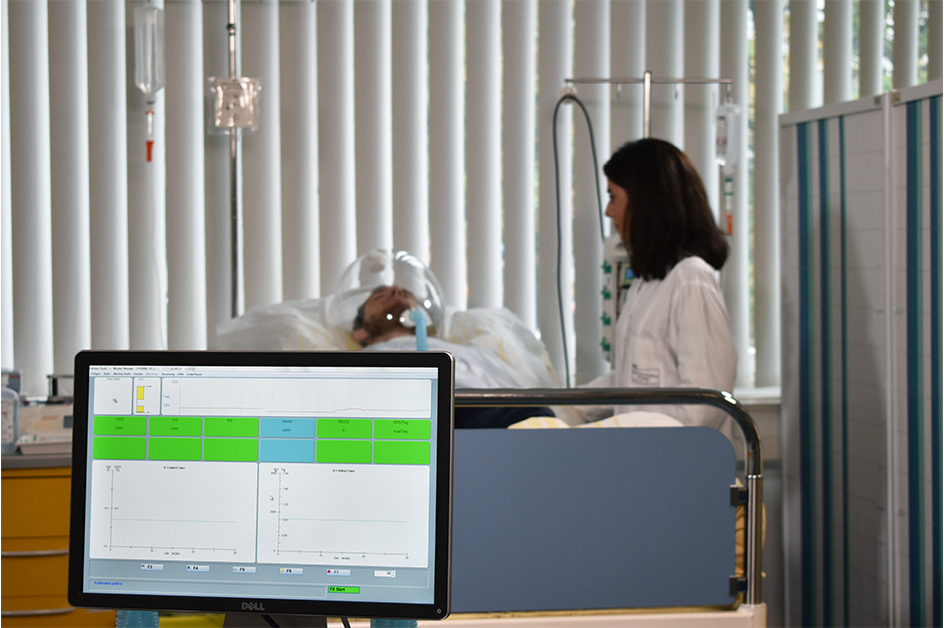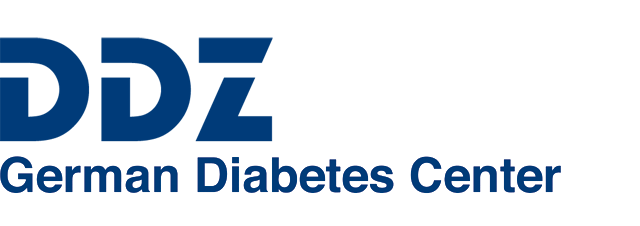
The Research Group Clinical Research Center focuses on clinical-experimental studies of diabetes and its sequelae in humans.
Main research activities are
- The detailed clinical, metabolic and immunologic characterisation of individuals with diabetes in observational studies like the German Diabetes Center (GDC) Study
- The analysis of the underlying mechanisms in the development of insulin resistance and type 2 diabetes
- The modification of the disease course of both type 1 and type 2 diabetes and its complications by pharmacological and lifestyle interventions
Research aims
- What are the mechanisms in the development of diabetes and its complications and what ist he impact of metabolic, immunologic and diet-related factors?
- The the disease course and the development of complications modifiable by interventions and are the effective and long-lasting?
Previous studies analysed whether the disease course of patients with type 1 or type 2 diabetes can be influenced by immune interventions, lifestyle changes and pharmacological interventions (phase I - IV studies). Besides regular clinical examinations (anthropometry, laboratory analysis and physical examination), numerous specialised analysis methods are available, such as Clamp-studies, ivGTT, endothelial function (FMD) and Intima-Media-Thickness (IMT), indirect calorimetry, spiroergometry, immunological characterization as well as biopsies and microdialysis of subcutaneous adipose tissue.
Join a clinical study at DDZ
Support us with your participation in a clinical study of DDZ. Learn more about the participation criteria, application and advantages for being a research participant.
Team
-
Francesco Battiato, B. Sc.
-
Lisa Berking
-
Dr. rer. nat. Christian Binsch
-
Gunhild Heitkamp, Dipl. Ökotroph.
-
Dr. med. Yanislava Karusheva
-
Silke Komoß
-
Dania Marel Méndez Cárdenas
-
Milena Peshkov
-
Katsiaryna Prystupa, M. Sc., MD
-
Dana Reimann
-
Lia Schmidt
-
Monika Schulte
-
Julia Schweinitzer
-
Martin Schön
-
Agnieszka Sutkowski
-
Silke Tosenovian
-
Miroslava Varadinova
-
Iryna Yurchenko
-
Dr. med. Oana-Patricia Zaharia
-
Lea Marie Zimmermann
Selected Publications
- Zaharia O-P, Strassburger K, Strom A, Bönhof G, Karusheva Y, Antoniou S, Bódis K, Markgraf D, Burkart V, Müssig K, Hwang JH, Asplund O, Groop L, Ahlqvist E, Seissler J, Nawroth P, Kopf S, Schmid SM, Stumvoll M, Pfeiffer A, Kabisch S, Tselmin S, Häring H-U, Ziegler D, Kuß O, Szendrödi J, Roden M for the GDS Group 2019. Risk of diabetes-associated diseases in subgroups of patients with recent-onset diabetes: a 5-year follow-up study. Lancet Diabetes Endocrinol. 7: 684-694. https://doi.org/10.1016/S2213-8587(19)30187-1
- Karusheva Y, Koessler T, Strassburger K, Markgraf D, Mastrototaro L, Jelenik T, Simon M-C, Pesta D, Zaharia O-P, Bódis K, Bärenz F, Schmoll D, Wolkersdorfer M, Tura A, Pacini G, Burkart V, Müssig K, Szendroedi J, Roden M 2019. Short-term dietary reduction of branched-chain amino acids reduces meal-induced insulin secretion and modifies microbiome composition in type 2 diabetes: a randomized controlled crossover trial. Am J Clin Nutr. 110: 1098-1107. https://doi.org/10.1093/ajcn/nqz191
- Zaharia OP, Bobrov P, Strassburger K, Bódis K, Karusheva Y, Scholz M, Markgraf DF, Burkart V, Schloot NC., Müssig K, Szendroedi J, Roden M for the GDS Group 2018. Metabolic Characteristics of Recently Diagnosed Adult-onset Autoimmune Diabetes Mellitus. J Clin Endocrinol Metab. 103: 429-437. https://doi.org/10.1210/jc.2017-01706
- Weber KS., Knebel B, Straßburger K, Kotzka J, Stehle P, Szendrödi J, Müssig K, Buyken AE, Roden M for the GDS Group 2016. Associations between explorative dietary patterns and serum lipid levels and their interactions with ApoA5 and ApoE haplotype in patients with recently diagnosed type 2 diabetes. Cardiovasc Diabetol. 15. https://doi.org/10.1186/s12933-016-0455-9
- Szendroedi J, Saxena A, Weber KS, Strassburger K, Herder C, Burkart V, Nowotny B, Icks A, Kuss O, Ziegler D, Al-Hasani H, Müssig K, Roden M for the GDS Group 2016. Cohort profile: the German Diabetes Study (GDS). Cardiovasc Diabetol. 15. https://doi.org/10.1186/s12933-016-0374-9
- Weber KS, Nowotny B, Strassburger K, Pacini G, Müssig K, Szendroedi J, Herder C, Roden M for the GDS Group 2015. The Role of Markers of Low-Grade Inflammation for the Early Time Course of Glycemic Control, Glucose Disappearance Rate, and β-Cell Function in Recently Diagnosed Type 1 and Type 2 Diabetes. Diabetes Care. 38: 1758-1767. https://doi.org/10.2337/dc15-0169
- Simon M-C, Strassburger K, Nowotny B, Kolb H, Nowotny P, Burkart V, Zivehe F, Hwang JH, Stehle P, Pacini G, Hartmann B, Holst JJ, MacKenzie C, Bindels LB, Martinez I, Walter J, Henrich B, Schloot NC, Roden M 2015. Intake of Lactobacillus reuteri Improves Incretin and Insulin Secretion in Glucose Tolerant Humans: A Proof of Concept. Diabetes Care. 38: 1827-1834. https://doi.org/10.2337/dc14-2690
Cooperations
- Heinrich-Heine-Universität Düsseldorf, Institut für Pharmakologie und Klinische Phahrmakologie: T. Hohlfeld
- Universität Giessen, Klinik für Psychosomatische Medizin und Psychotherapie: J. Kruse
- Forschungsinstitut der Diabetes Akademie Mergentheim (FIDAM): B. Kulzer, N. Hermanns
- Heinrich-Heine-Universität Düsseldorf, Klinik für Allgemeine Pädiatrie: T. Meissner, E. Mayatepek
- Koordinierungszentrum für Klinische Studien, Heinrich-Heine Universität Düsseldorf: C. Ohmann
Project Funding
- Bundesministerium für Bildung und Forschung (BMBF)
- Deutsches Zentrum für Diabetesforschung (DZD e. V.)
- European Commission (EC)
- European Foundation for the Study of Diabetes (EFSD)
- Industry Funds (z. B. Takeda Pharma, MDS Services, Pfizer)
Teaching Activities at Heinrich-Heine University Düsseldorf
- Lecture - Immune Biology with a clinical aspect for medical students (Burkart)
